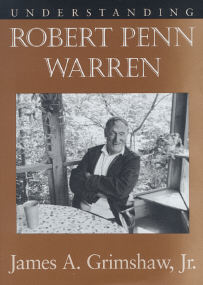Understanding RPW
|
UNDERSTANDING ROBERT PENN WARREN University of South Carolina Press Columbia, South Carolina 29208 5 x 7, 256 pages Understanding Contemporary American Literature, Matthew J. Bruccoli, series editor |
The end of man is to know. --Robert Penn Warren, All the King's Men (1946) Fiction, like the essay, drama, poem, sermon, or philosophical treatise, is the presentation of author's way of looking at life. --Robert Penn Warren, An Approach to Literature (1939) Let us ask, first why we read literature at all. Ultimately, we read it because it gives us an image of the human soul confronting its fate. --Robert Penn Warren, The Use of the Past |
Understanding Robert Penn Warren offers a comprehensive introduction to and commentary on the fiction, poetry, and drama of one of the twentieth century's most versatile writers and the first author to be honored as U.S. poet laureate. In this volume James A. Grimshaw, Jr., describes Warren's search for meaning in life and for a connection between self and others. Grimshaw examines the writer's views about the primacy of self-knowledge and explores the painful and arduous path his protagonists must follow to gain such knowledge and the interrelationship of his artistic endeavors, which were woven together by common thematic concerns—history, time, truth, responsibility, love, hope, and endurance. |
Grimshaw presents an overview of Warren's life and his literary criticism, the latter offering a lens through which readers can gain a better understanding of Warren's fiction, poetry, and drama. In addition to providing thorough readings of Warren's fiction and poetry, Grimshaw explores Warren's little-examined contributions as a playwright. Grimshaw renders a fresh perspective on Warren's plays as he points out the profound influence of William Shakespeare, the impact of such nineteenth-century authors as Samuel Taylor Coleridge and Thomas Hardy, and Warren's connection to such twentieth-century writers as T. S. Eliot and John Crowe Ransom. Underscoring the poet laureate's extensive achievements in the realm of letters, Grimshaw discusses Warren's focus on the universal concerns of society. While proposing that Warren comes as close as any writer of his generation to presenting a synoptic view of the human condition, Grimshaw draws primary attention to Warren's storytelling ability—a talent he rates as Warren's greatest legacy. James A. Grimshaw, Jr., teaches English and philosophy at Texas A&M University–Commerce. He has written and edited eight books, including Cleanth Brooks and Robert Penn Warren: A Literary Correspondence and, with James A. Perkins, Robert Penn Warren's "All the King's Men": Three Stage Versions. In addition, Grimshaw has published articles on E. A. Robinson, Donald Justice, Mary Lee Settle, Clyde Edgerton, Flannery O'Connor, and William Shakespeare. He holds B.A. and M.A. degrees from Texas Tech University, Lubbock, and a Ph.D. from Louisiana State University in Baton Rouge. Grimshaw lives in Greenville, Texas. For more on James A. Grimshaw, Jr. click here. |
